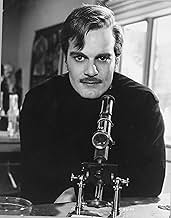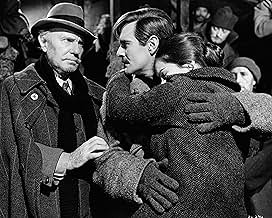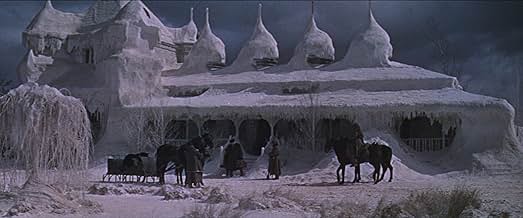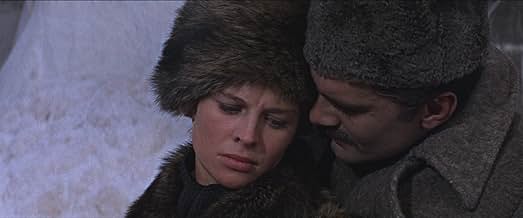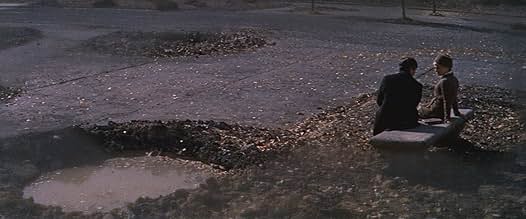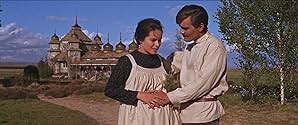A vida do poeta e físico russo que, apesar de casado, se apaixonou pela esposa de um ativista e viveu a Primeira Guerra Mundial e a Revolução de Outubro.A vida do poeta e físico russo que, apesar de casado, se apaixonou pela esposa de um ativista e viveu a Primeira Guerra Mundial e a Revolução de Outubro.A vida do poeta e físico russo que, apesar de casado, se apaixonou pela esposa de um ativista e viveu a Primeira Guerra Mundial e a Revolução de Outubro.
- Direção
- Roteiristas
- Artistas
- Ganhou 5 Oscars
- 21 vitórias e 13 indicações no total
- Liberius
- (as Gerard Tichy)
- Direção
- Roteiristas
- Elenco e equipe completos
- Produção, bilheteria e muito mais no IMDbPro
Resumo
Avaliações em destaque
Another worthless criticism: It's too slow, too long. Phooey. Some movies have to be slow and long to tell a big, detailed story.
If one is going to criticize this film, I suggest the following: 1. Screenwriter Robert Bolt's kneading of the characters' lives into the progression of the Russian revolution is sometimes at odds with actual chronology, so that anyone familiar with this period cringes from time to time. In one scene, in order to identify for the viewer the historical point that has been reached, a character blurts out (I paraphrase, but only very slightly): "Lenin is in Moscow! Civil war has started!" Neither could have been true at that moment in the narrative. Bolt could have polished his distillation of the novel, but who, apart from direct participants, can ever know why such gaffes occur in high-pressure multi-million-dollar productions? 2. This is yet another movie about a writer, in this case a beloved but politically controversial poet, not a word of whose poetry is revealed to the audience (except for the title of one poem, "Lara," after the woman he loves). Other major movies, including Julia (1977) and Wonder Boys (2000) also commit this offense. Ironically, one exception is the campy and rather dreary Isn't She Great (2000), about trash novelist Jacqueline Susann, which actually explores the act of writing! 3. The physical reproduction of the era is uneven. Some moments are too clean. One example: When Zhivago slides open the door of the ostensibly foul-smelling box car in which he and his family have been traveling for weeks packed alongside filthy, probably lice-ridden passengers, he looks too healthy, scrubbed and well rested. This and other moments stand out because they occur in the context of innumerable convincing depictions such as mud-filled wartime trenches, a looted and vandalized city mansion, or a half-frozen refugee tramping stiffly over the ice of a frozen lake. 4. It is said that Russian viewers laugh at the onion-domed house where the lovers hide from the Bolsheviks. Russian churches have onion domes, they say, but not houses. Granted. But I'd like to think that the person who built this particular house was an eccentric and got away with the concept because the house was in an isolated rural area away from the prying eyes of the "architecture police."
In any case, the emotional truths underlying the occasional inadequate or wrongheaded representations register powerfully. The grand-scale perspective gives a sense of the tumult of the times; vivid and memorable casting choices keep us fascinated with the characters and concentrated upon them; you feel the terrible losses people suffered when history so rudely pulled the rug out from under them; you are reminded of the pitiless cruelty of war and the depths to which people in its grip can descend; and how despite the tragedies of our history, we go on no matter what. David Lean had a great gift for injecting bold images at just the right moment. And he had the same gift for the perfectly timed sound effect, often occurring at an edit point. At Zhivago's end one feels a tremendous sense of sadness and loss but hope for the future. Considering the international political climate of the time of its release, it treats the Russian Revolution with enough detachment to illuminate both sides of the political divide. In other words, it doesn't propagandize for either side.
This was the first major Hollywood treatment of the Russian Revolution, was still running in theatres around the world two and three years after its initial release, despite dismissals from most of the major film critics of the time. Its popularity came from word of mouth, i.e., from the public's genuine love of the story and its striking, technically expert presentation. Interestingly, Zhivago as a box office blockbuster was second only to The Sound of Music, released the same year. Both films told the story of individuals faced with historically recent Old World political upheavals (communism/fascism). Furthermore, the soundtrack album of each film took on a life of its own, selling millions of copies. And why not also add that central to the success of each film was an English actress named Julie (Christie as Lara/Andrews as Maria). How many times have you heard of or personally known a woman under 40 with the previously uncommon name of Lara? Guess why that name became popular in the 60's and afterward?
The film is a sweeping saga of several people during the period of the Russian Revolution--both before and after. I could summarize the film but considering that there are already over 200 reviews, I'll spare you. At three hours and twenty minutes, oddly, not a lot seemed to occur in the film. I am not complaining or saying it was dull, as it was a lovely film--with very nice cinematography and music. It's just that the film is the type that slowly and deliberately unfolds--and the more hyperactive might not find that to their liking. The acting is quite nice but I think the real star is the direction. My only reservation is that with the great romance between Zhivago (Omar Sharif) and Lara (Julie Christie)--they both were married and Zhivago's wife (Geraldine Chaplin) was a lovely person. This did make it difficult for me to care about the characters more. Still, it's a lovely spectacle and well worth your time.
As materialists (matter precedes spirit, not vice versa), the Bolsheviks believed that they had found the holy grail of human progress in Marxism-Leninism, and were now able to assume the reins of history in their own hands. They believed that their violence was not only justified, but necessary, oblivious to the fact that they, too, somehow felt the angel of medieval teleology smiling over their shoulders.
In contrast to the Bolsheviks, Zhivago's ethos, if he had one, was almost identical to Kant's `categorical imperative,' which had just one axiom: treat people as ends in themselves, and not as ends to a mean. There couldn't be a sharper moral contrast.
There's a fabulous scene midway through the movie that highlights the difference in moral attitude. Dr. Zhivago confronts a communist functionary who has ordered the destruction of a village, a hamlet suspected of aiding the Mensheviks by selling them horses. To the Bolsheviks, if you weren't 100 percent behind them, you were a `counterrevolutionary,' sorta like Dubya's idea that you're either for us, or against us. And so Strelnikov, the passionate Bolshevik, glibly justifies his actions to Dr. Zhivago as easy as if he were tossing his hair aside, saying that the annihilation of the village, however cruel, is necessary to make a point. Zhivago replies: `Your point; their village.'
I love this film, a timeless epic. If there's a more beautiful heroine in all of movie-making history than Julie Christie (Lara), I'm not aware of it. And Omar Sharif is stunning as Iuri Zhivago, who heals the body with emetics, scalpels, antiseptic, and gauze, while he heals the soul with his poetry. Although the movie is three hours and 20 minutes long, the cinematography is so efficient, evocative, and densely layered that one hardly notices. This is, in my opinion, one of the best films of all time.
To borrow a line from the more recent `Moulin Rouge,' this is a story bout `love.' A love story set against the backdrop of the Russian Revolution. Dr. Yuri Zhivago (Omar Sharif) is a general practitioner, but he is also a poet; through his vocation as a man of medicine, he tends to those in need in everyday real life. But it is through his avocation as a poet that he expresses what he sees. He marries Tonya (Geraldine Chaplin) and has children; but the War and revolution intervene, and it is during these tumultuous times that his life becomes inexorably intertwined with a government official, Komarovsky (Rod Steiger), a young revolutionary, Pasha (Tom Courtenay), his half-brother, Yevgraf (Alec Guinness), and finally, Lara (Julie Christie). It's desperate times for Russians from all walks of life, and Zhivago does what he can to do what he can to keep the fragile threads of his life-- and of those around him-- intact. But fate plays a hand, and in the end, even Zhivago must go where Destiny leads.
With `Zhivago,' David Lean has crafted and delivered a magnificent and monumental motion picture of epic proportions that at the same time is disarmingly intimate, rendered as a world within a world, with each a vital part of the other. Lean blends actors, cinematography, story and music with his own compassionate perspective to create a true work of art; a work of true poetry. In telling his story, he offers breathtaking visuals, like the awesome vistas of the snow-covered Urals, or a long shot of a wide open Russian plain with a solitary figure in the distance trudging through the snow, juxtaposed against the enormity of the landscape.
Often, however, what he doesn't show you, but suggests, is even more effective and emotionally stirring. Consider the scene in which a complement of mounted dragoons, sabres drawn, ride down upon a crowd peacefully demonstrating in the city streets; Lean sets it up so that you understand what is about to happen, then trains his camera on Zhivago, watching from a balcony overlooking the street as the carnage unfolds below. And in Zhivago's eyes, in the expression on his face, in his reaction to what he is witnessing, there is more horror because of what Lean has established in your imagination-- and which significantly enhances the impact of it-- than anything the most graphic visual depiction could have produced. Similarly, when the Czar and his whole family are shot, Lean does not take you there; instead, you learn of it and realize the impact of it through the reaction of Alexander Gromeko (Ralph Richardson), Tonya's father, and it places it into a context that makes it all the more effective. This is filmmaking at it's best, and an example of what makes Lean's films so memorable.
Put a talented actor into the hands of a gifted director, and results of more than some distinction can be expected; and such is the case with Omar Sharif and David Lean. In 1962, Sharif received a Best Supporting Actor nomination for his work in Lean's `Lawrence of Arabia,' and in `Zhivago,' Lean's next film, Sharif gives a sensitive, affecting performance for which he should have received a Best Actor nomination, but inexplicably, did not (It was Lee Marvin's year for `Cat Ballou'). Still, as Yuri Zhivago, he has never been better. Sharif successfully manages to convey his deepest, internalized emotions, expressing them through the genuine compassion with which he imbues his character. Lean allows his star the time he needs to share with his audience his appreciation of the beauty he perceives in the world around him, and it's in those pensive moments that we, in turn, perceive the inner beauty and poetic nature of the man. You have but to look into Zhivago's eyes to know his sense of joy in all living things. It's a wonderful collaboration between actor and director that so vividly and poignantly brings this character to life.
1965 was a career year for Julie Christie; she received the Oscar for Best Actress for her work in `Darling,' yet in this film created an even more enduring and memorable character in Lara (aided in no small part by the hauntingly lovely `Lara's Theme,' by Maurice Jarre, which indelibly etched Christie/Lara in the consciousness of `Zhivago's vast, international audience). Lara's beauty is obvious, yet of a kind that goes much deeper than what you see on the surface; her station in life has made her vulnerable to misuse, but at the same time has endowed her with a strength born of necessity. And Zhivago sees in her a quality and a resourcefulness that fulfills his romantic notions of perfection, and with a beguiling screen presence and a performance to match, Christie makes those notions credible and believable.
Guinness, Richardson and Courtenay are exceptional in their respective roles-- Lean without question knows how to get the best out of his actors-- and also turning in noteworthy performances are Siobhan McKenna (Anna), Rita Tushingham (The Girl) and Klaus Kinski, who is unforgettable as Kostoyed, manacled and designated for forced labor, yet the `Freest man on this train!' One of Lean's greatest films. 10/10.
Você sabia?
- CuriosidadesThis movie wasn't shown in Russia until 1994.
- Erros de gravaçãoThe little girl who plays Tonya at Yuri's mother's funeral starts to cross herself in the Roman Catholic manner, but quickly corrects herself and finishes in the Russian Orthodox style.
- Citações
Komarovski: Lara, I am determined to save you from a dreadful error. There are two kinds of men, and only two, and that young man is one kind. He is high-minded. He is pure. He is the kind of man that the world pretends to look up to and in fact despises. He is the kind of man who breeds unhappiness; particularly in women. Now, do you understand?
Lara: No.
Komarovski: I think you do. There's another kind. Not high-minded. Not pure. But alive. Now that your taste at this time should incline towards the juvenile is understandable. But for you to marry that boy would be a disaster. Because there's two kinds of women...
[Lara covers her ears, he forces her arms down]
Komarovski: There are two kinds of women and you - as we well know - are not the first kind.
[Lara slaps him, he slaps her back]
Komarovski: You, my dear, are a slut.
Lara: I am not!
Komarovski: We'll see.
- Versões alternativasWhen it was first released, the film originally ran 197 minutes. Early in its run, David Lean and editor Norman Savage shortened it to 180 minutes; this version was in circulation for years. By the mid-1990s, the uncut version was restored.
- ConexõesEdited into Hollywood: The Dream Factory (1972)
Principais escolhas
Detalhes
- Data de lançamento
- Países de origem
- Central de atendimento oficial
- Idiomas
- Também conhecido como
- Doctor Zhivago
- Locações de filme
- Morley Flats, Alberta, Canadá(Frozen house longshots)
- Empresas de produção
- Consulte mais créditos da empresa na IMDbPro
Bilheteria
- Orçamento
- US$ 11.000.000 (estimativa)
- Faturamento bruto nos EUA e Canadá
- US$ 111.721.910
- Faturamento bruto mundial
- US$ 112.090.394
- Tempo de duração3 horas 17 minutos
- Cor
- Proporção
- 2.35 : 1
Contribua para esta página








